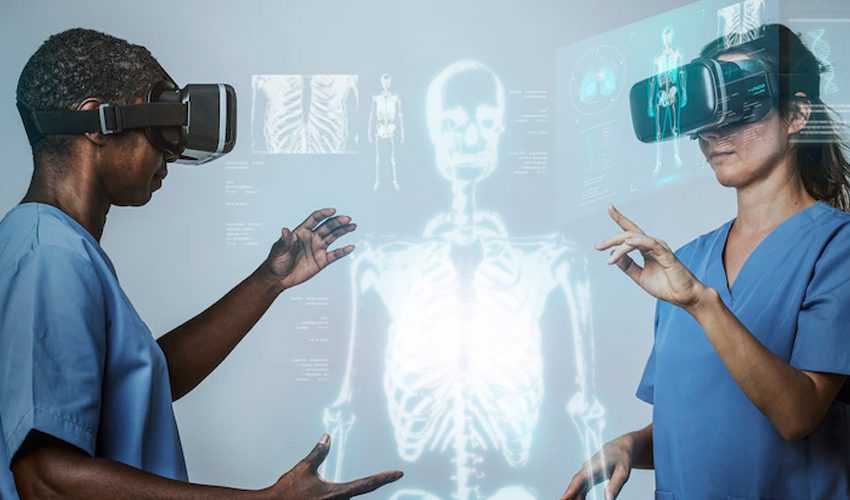Immersive Learning: How the Metaverse Reshapes Surgical Training

For ages, medical education has relied on the traditional educational approach where trainees have to learn by observing and assisting experienced surgeons in the operating room.
Yes, this approach has resulted in creating highly professional surgeons but there are a lot of challenges that come along this approach. In the traditional training approach, students have limited access to complex surgical cases.
This is not the only problem.
The difference in patient cases can make it difficult for surgical trainees to gain comprehensive experience.
And, its high cost and time-consuming nature?
Because of all these limitations, there is an increasing need for a more effective, efficient, and accessible surgical training approach which is immersive learning in the Metaverse.
The Rise of Immersive Learning in the Metaverse
Metaverse is a collective virtual shared space that is created by the convergence of virtual reality and the physical world. Metaverse has impacted a lot of industries and healthcare is not an exception to this.
Here is how immersive learning offered by Metaverse has changed the way surgeons are being trained-
Realistic Simulations
The power of realistic simulations offered by Metaverse can not be overstated. Within the Metaverse, surgical trainees can be exposed to incredibly lifelike medical scenarios where they can explore the medical world and practice within a virtual and safe environment.
Well, well, well! These simulations are way too far from the static 2D textbook diagrams and 2D traditional medical mannequins. Instead, in contrast to this, the simulations created in the Metaverse are dynamic, interactive, and tailored to replicate the most intricate details of surgical procedures.
All these immersive simulations provide the budding students with the sense of being there just like the physical world. Metaverse uses advanced technologies like augmented reality and VR for surgery training which allows budding surgeons to immerse themselves in simulated surgical environments that replicate the tactile and visual sensations of a physical operating room.
Not only this, these operation rooms in the Metaverse are equipped with virtual scalpels, sutures, and other instruments. The surgeons can make use of these elements and receive real-time haptic feedback to provide them with the feeling of incisions, tissue resistance, and the pulsating flow of blood.
Access to Diverse Cases
Within the traditional educational landscape, students have to learn by observation and assisting the professionals. Moreover, the difference in patient cases in the local hospitals or clinics limits the learning capability of the students.
As a solution to this concern, the metaverse also serves as a bridge across geographical boundaries, democratizing access to a vast array of surgical cases and scenarios.
Here, trainees are allowed to explore an extensive library of cases, be it common procedures or exceptionally rare and complex surgeries. The students can delve into the intricacies of different medical fields including cardiothoracic surgery, neurosurgery, orthopedics, and many other specialties.
The exposure to vast cases helps trainees build a more comprehensive understanding of surgical techniques, decision-making, and complications.
What is more interesting to know is that the metaverse offers a valuable opportunity for trainees to study cases from different regions and cultural contexts which enriches their medical perspective and prepares them to work effectively in a globalized healthcare environment.
Immediate Feedback
One of the most important hallmarks of Metaverse in medical education is the ability to provide immediate feedback to the students.
With the help of advanced technological tools, Metaverse is able to access the actions of the trainees in real-time. From the precision of an incision to the handling of tissues to the choice of instruments, the metaverse constantly tracks and evaluates the progress of the students.
With immediate feedback, trainees receive instant guidance on their medical techniques. It will help them in improving their decision-making skills. They can fine-tune their medical approach and shorten the time required to become an effective surgeon.
Challenges and Considerations
It is visible that Metaverse in higher education has a lot of advantages over the traditional setup when it comes to training medical students to perform surgeries. However, there are a lot of important
considerations and challenges offered by metaverse that need to be addressed. Some of them are the requirements of high-speed internet connection, access to high-quality VR/AR equipment, and the development of standardized curricula and certification processes.
We believe that with the constant advancement in the Metaverse, these challenges will be overcome in the near future.
To conclude, with the introduction of the metaverse in medical education, the surgical training landscape has completely changed.
It has created a learning environment that is more accessible, less costly, and more diverse than ever before. As we continue to explore and adapt to the metaverse, the boundaries of surgical education will expand, pushing the boundaries of what is possible in the field of medicine.

